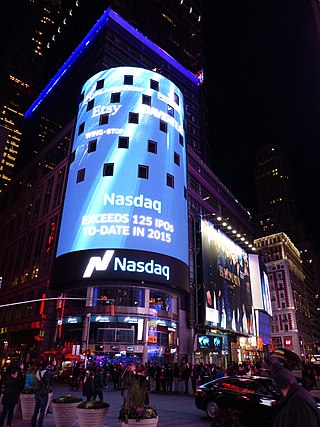Related Research Articles

In finance, a derivative is a contract that derives its value from the performance of an underlying entity. This underlying entity can be an asset, index, or interest rate, and is often simply called the "underlying". Derivatives can be used for a number of purposes, including insuring against price movements (hedging), increasing exposure to price movements for speculation, or getting access to otherwise hard-to-trade assets or markets.

A credit default swap (CDS) is a financial swap agreement that the seller of the CDS will compensate the buyer in the event of a debt default or other credit event. That is, the seller of the CDS insures the buyer against some reference asset defaulting. The buyer of the CDS makes a series of payments to the seller and, in exchange, may expect to receive a payoff if the asset defaults.
The International Swaps and Derivatives Association is a trade organization of participants in the market for over-the-counter derivatives.

Over-the-counter (OTC) or off-exchange trading or pink sheet trading is done directly between two parties, without the supervision of an exchange. It is contrasted with exchange trading, which occurs via exchanges. A stock exchange has the benefit of facilitating liquidity, providing transparency, and maintaining the current market price. In an OTC trade, the price is not necessarily publicly disclosed.
The Depository Trust & Clearing Corporation (DTCC) is an American post-trade financial services company providing clearing and settlement services to the financial markets. It performs the exchange of securities on behalf of buyers and sellers and functions as a central securities depository by providing central custody of securities.

Nasdaq, Inc. is an American multinational financial services corporation that owns and operates three stock exchanges in the United States: the namesake Nasdaq stock exchange, the Philadelphia Stock Exchange, and the Boston Stock Exchange, and seven European stock exchanges: Nasdaq Copenhagen, Nasdaq Helsinki, Nasdaq Iceland, Nasdaq Riga, Nasdaq Stockholm, Nasdaq Tallinn, and Nasdaq Vilnius. It is headquartered in New York City, and its president and chief executive officer is Adena Friedman.
iTraxx is the brand name for the family of credit default swap index products covering regions of Europe, Australia, Japan and non-Japan Asia. Credit derivative indexes form a large sector of the overall credit derivative market. The indices are constructed on a set of rules with the overriding criterion being that of liquidity of the underlying credit default swaps (CDS).

Options Clearing Corporation (OCC) is a United States clearing house based in Chicago. It specializes in equity derivatives clearing, providing central counterparty (CCP) clearing and settlement services to 16 exchanges. Started by Wayne Luthringshausen and carried on by Michael Cahill. Its instruments include options, financial and commodity futures, security futures and securities lending transactions.

Intercontinental Exchange, Inc. (ICE) is an American company formed in 2000 that operates global financial exchanges and clearing houses and provides mortgage technology, data and listing services. Listed on the Fortune 500, S&P 500, and Russell 1000, the company owns exchanges for financial and commodity markets, and operates 12 regulated exchanges and marketplaces. This includes ICE futures exchanges in the United States, Canada and Europe, the Liffe futures exchanges in Europe, the New York Stock Exchange, equity options exchanges and OTC energy, credit and equity markets.
A central clearing counterparty (CCP), also referred to as a central counterparty, is a financial institution that takes on counterparty credit risk between parties to a transaction and provides clearing and settlement services for trades in foreign exchange, securities, options, and derivative contracts. CCPs are highly regulated institutions that specialize in managing counterparty credit risk.
Markit Ltd. was a British financial information and services company with over 4,000 employees, founded in 2003 as an independent source of credit derivative pricing. The company provides independent data, trade processing of derivatives, foreign exchange and loans, customised technology platforms and managed services. The company aims to enhance transparency, reduce financial risk and improve operational efficiency. Its client base includes institutional participants in the financial marketplace. On 12 July 2016, Markit and IHS Inc. merged in an all-stock merger of equals to form IHS Markit. IHS Markit later merged with S&P Global on 28 February 2022.

Jacqueline Kay Swinburne is a Welsh Conservative politician who was a Member of the European Parliament (MEP) for Wales between 2009 and 2019.
LCH is a British clearing house group that serves major international exchanges, as well as a range of OTC markets. The LCH Group consists of two subsidiaries: LCH Ltd and LCH SA. Based on 2012 figures, LCH cleared approximately 50% of the global interest rate swap market, and was the second largest clearer of bonds and repos in the world, providing services across 13 government debt markets. In addition, LCH clears a broad range of asset classes including: commodities, securities, exchange traded derivatives, credit default swaps, energy contracts, freight derivatives, interest rate swaps, foreign exchange and Euro and Sterling denominated bonds and repos.

Blythe Masters is a British Private Equity executive and former financial services and fintech executive. She is a former executive at JPMorgan Chase, where she was widely credited as the creator of the credit default swap as a financial instrument. She is founding partner of FinTech private equity firm, Motive Partners, CEO of Motive Capital Corp, an Advisory Board Member of the US Chamber of Digital Commerce, a Board Member of GCM Grosvenor, Forge Global, CAIS Group, and Credit Suisse Group.
A Trade Repository or Swap Data Repository is an entity that centrally collects and maintains the records of over-the-counter (OTC) derivatives. These electronic platforms, acting as authoritative registries of key information regarding open OTC derivatives trades, provide an effective tool for mitigating the inherent opacity of OTC derivatives markets.

The Moscow Exchange is the largest exchange in Russia, operating trading markets in equities, bonds, derivatives, the foreign exchange market, money markets, and precious metals. The Moscow Exchange also operates Russia's central securities depository, the National Settlement Depository (NSD), and the country's largest clearing service provider, the National Clearing Centre. The exchange was formed in 2011 in a merger of the Moscow Interbank Currency Exchange and the Russian Trading System.
The European Market Infrastructure Regulation (EMIR) is an EU regulation aimed at reducing systemic counterparty and operational risk and thereby prevent future financial system collapses. Its focus is regulation of over-the-counter (OTC) derivatives, central counterparties and trade repositories. It provides steer on reporting of derivative contracts, implementation of risk management standards and common rules for central counterparties and trade repositories.
ICE Clear Credit LLC, a Delaware limited liability company, is a Derivatives Clearing Organisation (DCO) previously known as ICE Trust US LLC which was launched in March 2009. ICE offers trade execution and processing for the credit derivatives markets through Creditex and clearing through ICE Trust™. ICE Clear Credit LLC operates as a central counterparty (CCP) and clearinghouse for credit default swap (CDS) transactions conducted by its participants. ICE Clear Credit LLC is a subsidiary of IntercontinentalExchange (ICE). ICE Clear Credit LLC is a wholly owned subsidiary of ICE US Holding Company LP which is "organized under the law of the Cayman Islands but has consented to the jurisdiction of United States courts and government agencies with respect to matters arising out of federal banking laws."

Securities market participants in the United States include corporations and governments issuing securities, persons and corporations buying and selling a security, the broker-dealers and exchanges which facilitate such trading, banks which safe keep assets, and regulators who monitor the markets' activities. Investors buy and sell through broker-dealers and have their assets retained by either their executing broker-dealer, a custodian bank or a prime broker. These transactions take place in the environment of equity and equity options exchanges, regulated by the U.S. Securities and Exchange Commission (SEC), or derivative exchanges, regulated by the Commodity Futures Trading Commission (CFTC). For transactions involving stocks and bonds, transfer agents assure that the ownership in each transaction is properly assigned to and held on behalf of each investor.

A clearing house is a financial institution formed to facilitate the exchange of payments, securities, or derivatives transactions. The clearing house stands between two clearing firms. Its purpose is to reduce the risk of a member firm failing to honor its trade settlement obligations.
References
- ↑ "Financial and Business News | Financial News London".
- ↑ "About the Clearing Corporation". Archived from the original on 2008-10-05. Retrieved 2008-10-07.
- ↑ "CCorp and DTCC CDS Clearing". Archived from the original on 2012-02-17. Retrieved 2012-10-31.
- ↑ "CCorp NY Bank". Archived from the original on 2011-06-16. Retrieved 2008-10-07.
- ↑ "CCorp says CDS clearing counterparty will launch by year-end". 29 September 2008.